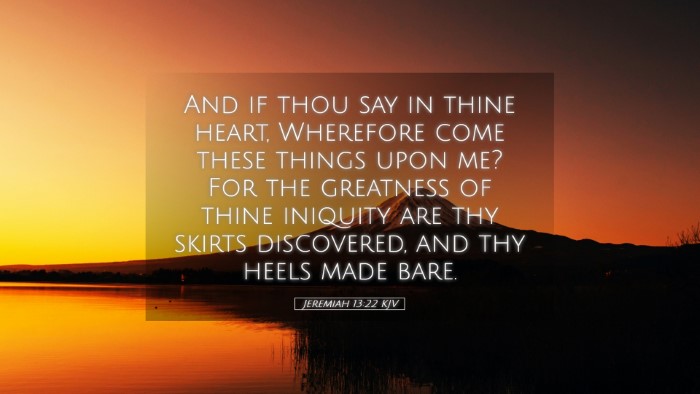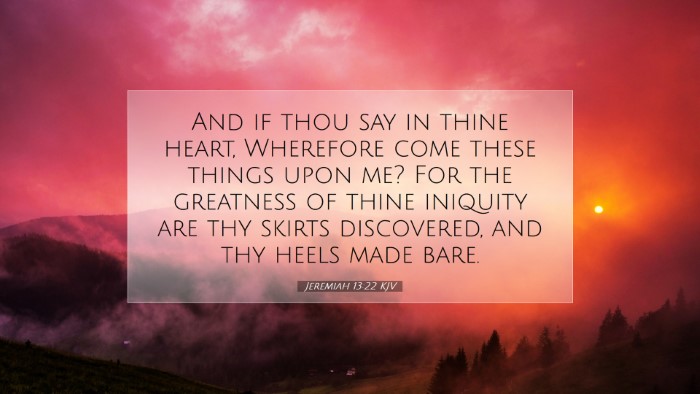Commentary on Jeremiah 13:22
Jeremiah 13:22 states, "And if you say in your heart, Why have these things come upon me? For the greatness of your iniquity your skirts have been uncovered, and your heels made bare." This verse captures a moment of reflection in Judah’s spiritual and moral decline, providing profound insights into divine judgment and human responsibility.
Contextual Background
The Book of Jeremiah is a pivotal text that chronicles the prophetic ministry of Jeremiah during the last years of the Kingdom of Judah leading up to its conquest by Babylon. Jeremiah's prophecies often blend warnings of impending judgment with calls to repentance, thereby laying the groundwork for understanding the relational dynamic between humanity and God.
Analysis of Key Themes
-
Divine Judgment:
Jeremiah speaks of the 'unalterable consequence of sin.' Matthew Henry emphasizes that sin invariably leads to suffering and chastisement from God. This theme resonates throughout the prophetic literature, underscoring the seriousness of iniquity that is often downplayed or ignored.
-
Human Inquiry:
The verse poses an introspective question: "Why have these things come upon me?" This reflects the human tendency to seek answers in the face of suffering. Albert Barnes notes that it is a common reaction of individuals facing calamity to question the reasons behind their hardships. This inquiry reveals a desire to understand the cause of distress, often pointing back to sin as the catalyst for suffering.
-
Consequences of Iniquity:
In the latter part of the verse, the phrase "for the greatness of your iniquity" illustrates that the severity of Judah's situation is directly proportional to their transgressions. Adam Clarke expounds on the metaphor of the 'skirt being uncovered,' symbolizing shame and public humiliation – a vivid representation of the consequences that befall the nation due to their disobedience to God.
Theological Reflections
The implications of Jeremiah 13:22 stretch into the realm of theological discourse concerning sin and grace. Scholars argue that while the verse emphasizes divine wrath, it also implicitly calls attention to God's grace and the possibility of repentance. A deeper exploration of this duality reveals God’s profound desire for restoration even amidst judgment.
The Role of Repentance
Jeremiah's message was not merely to pronounce doom but to call the people back to a right relationship with God. Matthew Henry asserts that understanding sin's consequences should drive individuals toward true repentance, which is essential for spiritual renewal.
The Nature of God’s Justice
The justice of God is presented as both severe and redemptive. God does not act arbitrarily; rather, He enforces justice as a reflection of His holiness. According to Clarke, this verse serves as a reminder that God’s justice is inextricably linked to His goodness. The uncovering of one's skirts is a sobering reminder that divine scrutiny reveals the nakedness of sin before a holy God.
Practical Application
For pastors and spiritual leaders, Jeremiah 13:22 serves as a crucial text for teaching about the nature of sin and its repercussions. Additionally, it provides a foundation for preaching on themes of justice, repentance, and God’s enduring love. Here are several actionable points:
-
Encouragement to Examine One's Heart:
Encourage congregants to reflect on their personal lives, drawing from the inquiry posed in the text to ask themselves essential questions about their walk with God.
-
Emphasize Repentance:
Highlight the importance of turning away from sin and seeking God's forgiveness, recognizing that God’s judgment, while real, is accompanied by His desire to restore.
-
Educate on God’s Justice:
Teach that God’s justice is not vindictive but restorative — meant to cleanse and bring about a deeper relationship with Him.
Conclusion
Jeremiah 13:22 serves as a poignant reminder of the consequences of sin and the nature of divine justice. It challenges readers and hearers alike to confront their iniquities and seek a restored relationship with God. By carefully considering the perspectives offered by public domain commentaries, one can grasp the weight of the text and its significance for both ancient Judah and contemporary believers.


